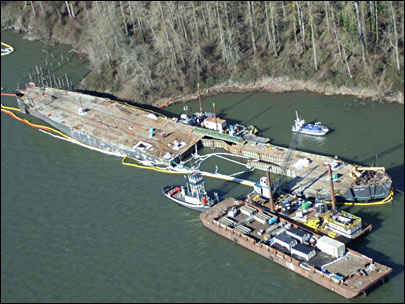forum
library
tutorial
contact

'Columbia River Basin Restoration Act' Passes
Congress, Aims to Reduce Toxic Contaminants
by Staff
Columbia Basin Bulletin, December 18, 2016
|
the film forum library tutorial contact |

|
'Columbia River Basin Restoration Act' Passes
by Staff
|
 The Columbia River Basin Restoration Act, aimed at reducing toxins, passed the House and Senate last week as a part of the Water Resources Development Act of 2016.
The Columbia River Basin Restoration Act, aimed at reducing toxins, passed the House and Senate last week as a part of the Water Resources Development Act of 2016.
The act establishes a competitive grant program to help local groups voluntarily clean up, monitor, and reduce the use of toxics within the Columbia River Basin. The Water Resources Development Act now goes to President Obama's desk where it is expected to be signed into law.
"The Estuary Partnership has worked on passage of this Act for eight years, and we are thrilled that the bill passed both houses of Congress. This victory could not have happened without the numerous partners who worked to build support for the Act throughout the northwest. We are especially grateful the leadership of our northwest Congressional delegation for being champions for our river," said Estuary Partnership Executive Director Debrah Marriott.
Oregon's Democratic Sen. Jeff Merkley and Rep. Earl Blumenauer (D-OR) first introduced the Columbia River Basin Restoration Act in 2010.
The Columbia River Basin Restoration Act would be administered by the Environmental Protection Agency but adds no new authorization to regulate. The purpose of the Act is strictly to establish a competitive grant program to help local groups voluntarily clean up, monitor, and reduce the use of toxics within the Columbia River Basin.
The purpose of the act is to address:
(See CBB, Aug. 8, 2014, Oregon Democrats Introduce Columbia River Restoration Act To Address Toxic Contaminants)
The Columbia River basin remains one of only two major EPA designated ‘large aquatic ecosystems' to receive zero funding for clean-up pursuant to this designation. Since 2009, ‘large aquatic ecosystems' including the Great Lakes and Puget Sound have received a total of over $3 billion in funding to protect and preserve their watersheds.
This act is intended to bring the Columbia River Basin in line with other ‘large aquatic ecosystems,' reduce the presence of toxics in the basin, and protect the health of communities by avoiding costly environmental clean-ups, economic loss, and health impacts.
Toxins are present throughout the Columbia Basin, and are harmful to humans, fish, and wildlife. These contaminants make their way into fish tissue and can be dangerous to humans if consumed. Some of these toxins are known to cause cancer and have been linked with neurological, developmental, and reproductive problems, including birth defects and learning disabilities.
Related Pages:
Congress Floats River Program by Staff, The Dalles Chronicle, 12/14/16
Congress Passes Columbia River Restoration Act by George Plaven, East Oregonian, 12/12/16
Columbia River Cleanup Bill Passes Congress by Courtney Flatt, Oregon Public Broadcasting, 12/14/16
Superfund Expert says Natural Recovery Won't Work to Clean Up Portland Harbor by Bianca Pahl & Steve Law, Portland Tribune, 6/24/16
DoE Proposes New Approach for Hanford Nuclear Cleanup by Staff, Modern Power Systems, 9/27/13
Toxic Contaminants and Their Effects on Salmonids by Morace, Johnson & Nilsen, Science Policy Exchange, 9/11/9
learn more on topics covered in the film
see the video
read the script
learn the songs
discussion forum
